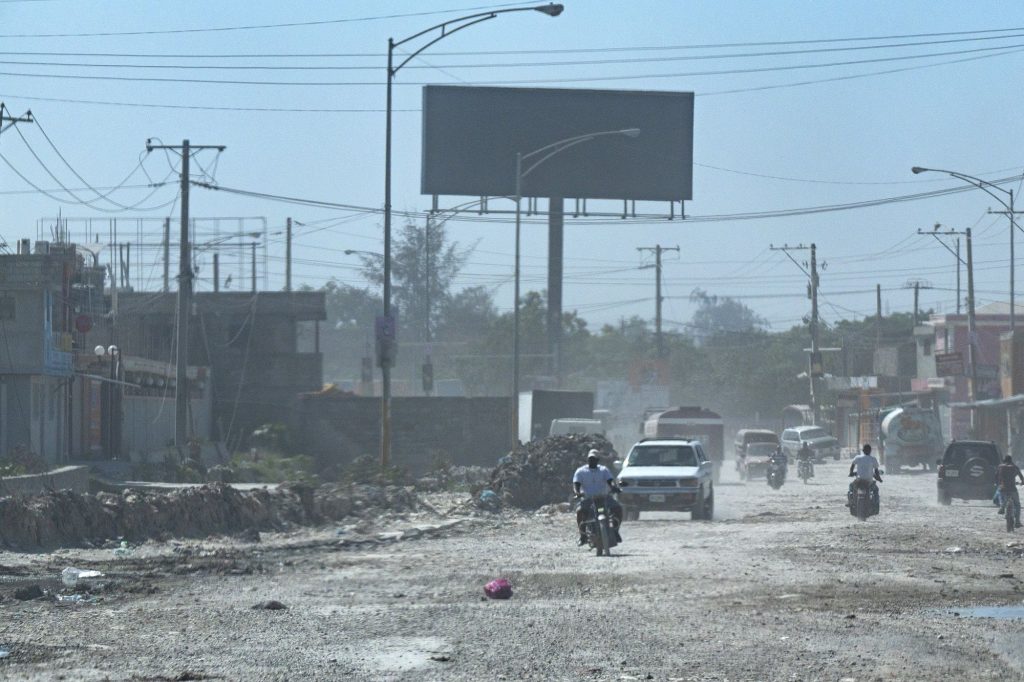By Caitlin Stephen Hu, David Culver and Evelio Contreras, CNN
Port-au-Prince, Haiti (CNN) — The wide road that passes in front of Haiti’s Toussaint Louverture International Airport has a post-apocalyptic stillness these days. Where cars and crowds of people once massed, only tendrils of smoke rise from smoldering piles of trash, sending a bitter taste into the air.
An armored police vehicle hulks nearby; the few police officers on watch cover their faces with balaclavas. This street looks nearly abandoned, as if in the wake of a disaster – an experience that people in Port-au-Prince know better than most. But leaving the city isn’t an option this time; the airport, under siege by gangs, has been forced to close.
Since the start of the month, criminal groups have been attacking with unprecedented coordination the last remnants of the Haitian state – the airport, police stations, government buildings, the National Penitentiary. The culmination of years of growing gang control and popular unrest, their joint assault forced Prime Minister Ariel Henry to resign last week, a stunning capitulation that has nevertheless proven futile in restoring calm.
Port-au-Prince’s gangs are still choking off the supply of food, fuel and water across the city. Perhaps the last functional part of the state, Haiti’s National Police, continue to fight, battling to reclaim ground block by block across the city. But the very life of the city they are fighting for seems to be waning, as intensive urban warfare grinds down on basic human ties.
The social fabric is fraying as businesses and schools stay shuttered. Many residents self-isolate, afraid to leave their homes. Some have turned to vigilantism. Fear, mistrust, and anger reign. Death is on everyone’s mind.
Vigilante justice, approved by the police
In the Port-au-Prince neighborhood of Canapé Vert on Monday, crowds seized a man they accused of belonging to a nearby gang – forcing him to walk down the road toward a cemetery before killing him and setting his body on fire in the street, sources in the community told CNN.
Videos seen by CNN showed remains smoking on the pavement in front of a shuttered supermarket, adding to a stretch of thick black soot. At this corner, the indelible mark of extrajudicial executions is all that remains of hundreds of suspected criminals killed by residents, their bodies disposed of by flame according to a local security source.
Gangs have long haunted the residents of Port-au-Prince, but their reach has dramatically expanded over recent years, covering 80% of the city today, according to UN estimates. Seeing their city shrinking, many Haitians in this region and beyond have organized among themselves in a vigilante movement known as bwa kale.
The anti-gang movement has seen communities form neighborhood defense committees with shared fortifications, surveillance systems, checkpoints and even patrols.
Their solidarity is effective; in 2023, for example, several areas of the city’s hilly residential areas joined forces with local police to push back the Ti Makak gang, ultimately expelling it from the area entirely, according local sources and a February 2024 report by the Swiss-based Global Initiative Against Transnational Organized Crime.
But the line between defense and mob justice is easily crossed. Vigilante groups have also lynched hundreds of people suspected of gang membership or “common crimes,” according to an October 2023 United Nations report.
Speaking to CNN in a car-filled lot next to a church, whose open doors revealed a wedding in progress, one militia member told CNN that his group had repelled repeated gang attempts to seize Canapé Vert.
“This is the way the gangs operate: they take over areas with big businesses and force them to pay them while they remain in control,” he said, noting that the area contains several high-profile businesses, including two national cellular companies and a major hotel. He spoke to CNN on condition of anonymity out of concerns for his safety.
“We constantly receive threats; they say they will come and attack us, destroy the neighborhood. So we block the streets and the police to do the searches; no civilians are involved in searching cars,” he added. The militia is armed only with “machetes and our bare hands,” he said.
People apprehended by these vigilante groups are often accused of being spies for the gangs, according to a local security source.
“The bandits send the spy on a motorcycle to come see if there’s a barricade in the road, and how many people are manning it. But if someone comes looking suspicious, they’ll question him, find out who he is, check his telephone. If he has messages with bandits, they have to take him,” the source said. “Then they burn them.”
“It’s not a war,” he emphasizes. “The neighborhood is trying to protect itself.” But he recognizes that there’s no judicial process for those.
Local police meanwhile tell CNN that they know the militia well and even rely on them, with one commander crediting the group with saving the Canapé Vert police station from a particularly intense gang attack last spring. Over a dozen suspected gang members in that instance were killed and burned outside the police station, according to the commander, who requested anonymity for his security.
Refugees in their own city
Just five minutes away by car, another community is trying desperately to hold together in even more trying conditions: a displacement camp – one of dozens of sites across the city where tens of thousands of city residents congregate, after being forced from their homes by violence and arson.
Marie Maurice, 56, had seen the gang take territory closer and closer; on February 29, when the warning came of an imminent gang attack, she didn’t waste any time. She left all her belongings behind and fled with the others nearly an hour on foot to the public Argentine Bellegarde school for shelter, she said.
Nearly three weeks weeks later, children here fly kites made of discarded foil and plastic, drive homemade toy cars cut from empty soda cans, with bottle caps for wheels and stones for passengers.
The adults also make a show of normalcy, but with a sense of futility; they’ve elected a leader to liaise with local police and to advocate for aid organizations to bring food and water, for example, but little aid has actually come due to roadblocks across the city.
Maurice tries to keep her family’s little corner of the crowded space clean, washing the floor with water that she has to walk 20 minutes to purchase. But no one in her family has enough to eat or even space to cook, living off a shared bite or piece of street food each day. Even a mint might count as a meal, she told CNN.
On the day we met her, she hadn’t eaten at all.
Beyond the difficulty of daily survival, several residents of the camp say they know they’ve worn out their welcome and that relations are worsening with their neighbors. There have been clashes with locals anxious for them to move on, fearing that the influx of outsiders could attract gang attention.
Anticipating the effects of dwindling resources and worsening violence, the International Organization for Migration has repeatedly warned of a sharpening “climate of mistrust” in Haiti that would fray traditional social safety nets, leaving people with nowhere to go.
“High levels of insecurity are creating a climate of mistrust between certain host communities and displaced populations, thus deteriorating social cohesion,” the organization said in an August 2023 report, which also noted that more and more displaced Haitians are ending up in such camps rather than relying on friends and family.
The little school where Maurice lives is already far past capacity. But every day, more people join them from other parts of the city, further straining what few resources the site provides – the building’s septic tank is full and the toilets backed up, one resident showed CNN. Its water cistern is nearly dry.
Today, 1,575 people are now living packed into the grid of open-air classrooms – just a handful compared to the over 360,000 who have been displaced across the country according to the International Organization for Migration (IOM).
Divided by fear
Port-au-Prince has been terrorized for years by frequent kidnappings, torture, and rape by the gangs. But today, as Haiti’s elite haggles over the composition of a presidential transitional council – and the international community remains unwilling to intervene – talk of a political solution sounds more than ever like wishful thinking as long as gunshots ring out in the evenings, puncturing the city’s hush.
The proliferation of police, gang and civilian checkpoints meanwhile is fracturing Haiti’s capital into wary and anxious fiefdoms. Increasingly, the only thing that everyone shares is trauma.
Marie-Suze Saint Charles, 47, says her own sons are too terrified of the constant violence to even visit her in the hospital, where she is recovering from a shooting on March 1 that shattered her leg, after being attacked on her way back from work.
One son, 17, was also shot and is in a different hospital. Her other sons – eight and thirteen years old – refuse to leave the house. She is not sure who, if anyone, is feeding them.
“They are scared of the street,” she told CNN from her hospital bed. “They don’t even want to come see me. They are too scared to go outside.”
The-CNN-Wire
™ & © 2024 Cable News Network, Inc., a Warner Bros. Discovery Company. All rights reserved.






More Stories
Bulls one win away from BABA title
Renewed efforts to deal with monkey population
Barbados joins several other countries recognising Palestine